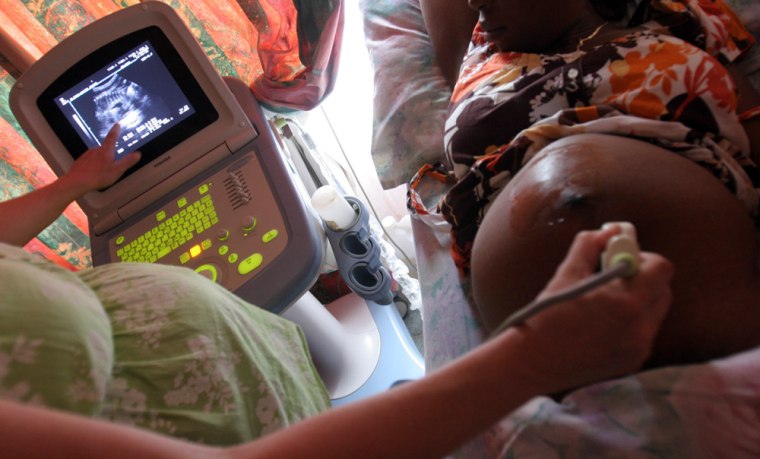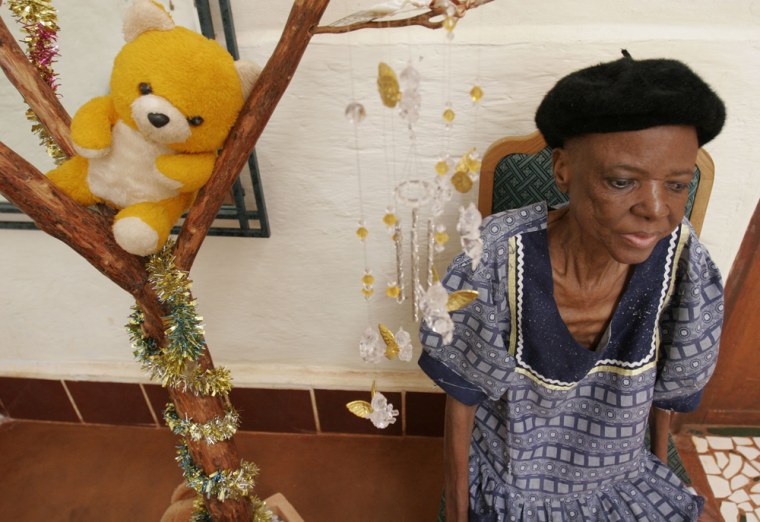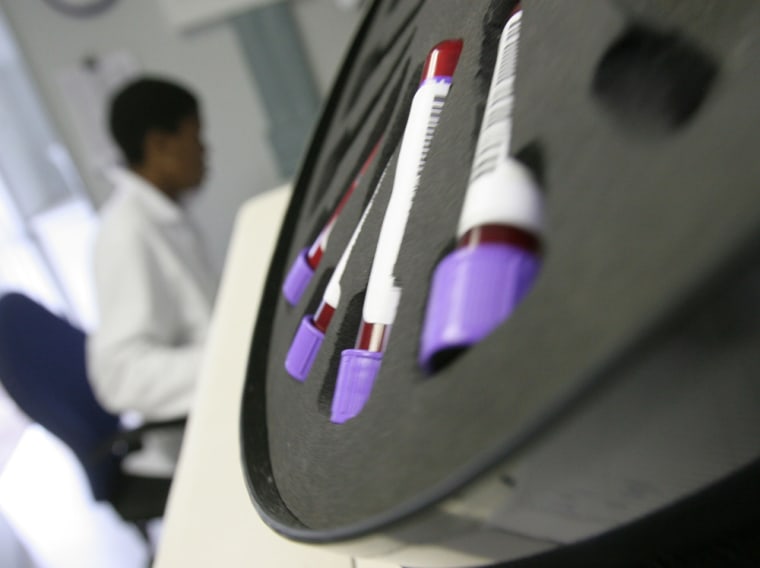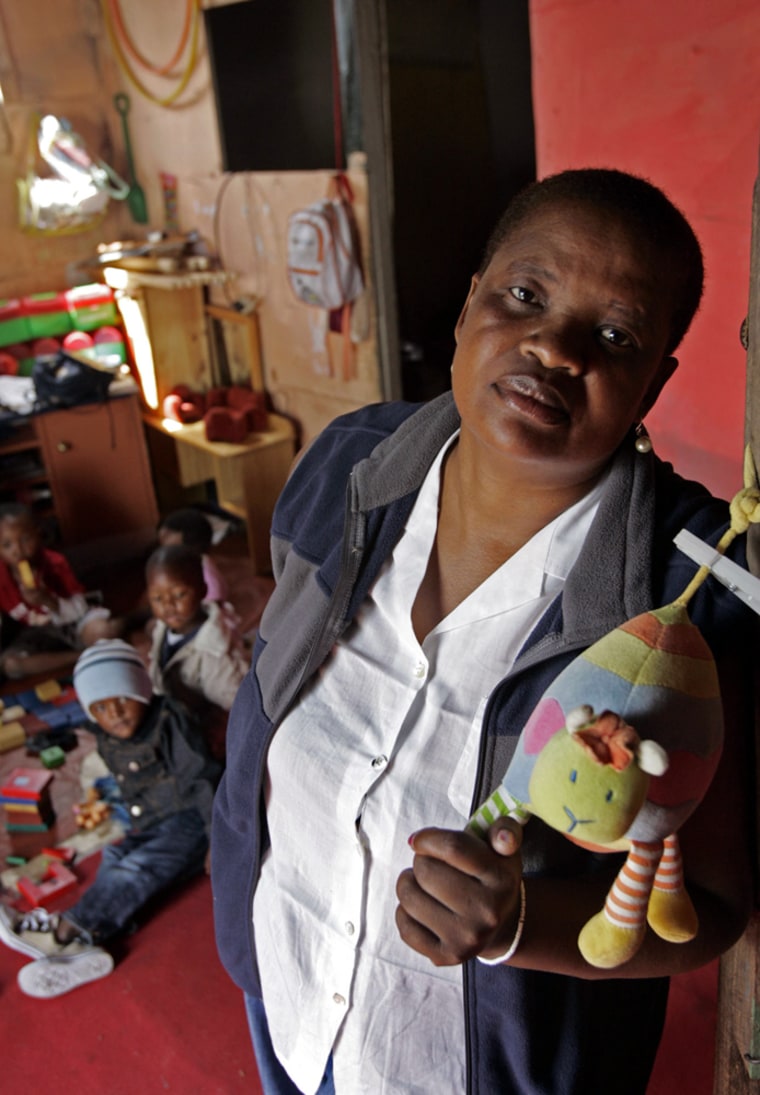In her AIDS-scarred South African township, Sweetness Mzolisa leads a chorus of praise for George W. Bush that echoes to the deserts of Namibia, the hills of Rwanda and the villages of Ethiopia.
Like countless Africans, Mzolisa looks forward to Barack Obama becoming America's first black president Jan 20. But — like countless Africans — Mzolisa says she will always be grateful to Bush for his war on AIDS, which has helped to treat more than 2 million Africans, support 10 million more, and revitalize the global fight against the disease.
"It has done a lot for the people of South Africa, for the whole of the African continent," says Mzolisa, a feisty mother of seven. "It has changed so many people's lives, saved so many people's lives."
Mzolisa, 44, was diagnosed with the AIDS virus in 1999 and formed a women's support group to "share the pain." In 2004 she received a U.S. grant to set up office in a shipping container and start a soup kitchen from the group's vegetable garden. She stretches her $10,000 in annual funding to train staff to look after bedridden AIDS victims, feed and clothe orphans, and do stigma-busting work at schools and taxi ranks.
Hundreds of projects get funding
Hundreds of similar small grass-roots projects are being funded by the President's Emergency Plan for AIDS Relief, or PEPFAR, alongside higher-profile charities and big state clinics.
Bush launched the $15 billion plan in 2003 to expand prevention, treatment and support programs in 15 hard-hit countries, 12 of them African, which account for more than half the world's estimated 33 million AIDS infections. The initiative tied in with a World Health Organization campaign to put 3 million people on AIDS drugs by 2005 — a goal it says was reached in 2007.
Congress last year passed legislation more than tripling the budget to $48 billion over the next five years, with Republicans and Democrats alike hailing the program as a remarkable success.
But the task remains enormous. More than 1.5 million Africans died in 2007 (the U.S. death toll is under 15,000), fewer than one-third had access to treatment, and new infections continued to outstrip those receiving life-prolonging drugs.

In most African countries, life expectancy has dropped dramatically, and only a few, like Botswana, have started to turn the corner again.
And with no end in sight to the global financial crisis, there are fears about whether all the funding approved by Congress will be delivered.
There continue to be detractors who say the U.S. administration should have channeled the money through the U.N.; that it has placed too much emphasis on faith-based groups and abstinence; that it has trampled on women's health by shunning anything associated with abortions; that it has concentrated on AIDS treatment at the expense of prevention; and that it has diverted attention away from bigger killers like pneumonia and diarrhea.
Helen Epstein, an AIDS expert who has consulted for the U.N. and the World Bank, says both the U.N. and PEPFAR have failed disastrously on prevention by preaching abstinence until marriage and failing to recognize that in some African cultures it is the norm to have several simultaneous long-term relationships.
Critics say money could be better spent
She says the money would be better spent on strengthening African health care systems rather than focusing on a single disease.
Johanna Hanefeld at the London School of Hygiene and Tropical Medicine says her research in Zambia indicated that the U.N. Global Fund to Fight AIDS, TB and Malaria was more effective in using HIV programs as a lever to improve health care and staff training, rather than scattering cash among many non-governmental groups, faith-based or other.
PEPFAR ambassador Mark Dybul dismisses criticism that the funding is too narrowly focused.
"In Africa you can't tackle development goals unless you tackle HIV/AIDS," he says, citing the devastation wreaked on professions like nursing and teaching.
Besides PEPFAR, Bush has launched a five-year, $1.2 billion initiative to cut malaria deaths in 15 African nations by half.
Dybul also says it is unfair to accuse the U.S. of overemphasizing abstinence because PEPFAR is a major supplier of condoms to the targeted African countries. For instance, PEPFAR figures show 60 million condoms going to Zambia, 40 million to Rwanda, 145 million to Ethiopia in the past five years.
Some critics, like rockers-turned-advocates Bono and Bob Geldof, have become admirers.
"The Bush regime has been divisive ... created bitterness — but not here in Africa. Here, his administration has saved millions of lives," Geldof wrote in Time Magazine as he accompanied Bush on an Africa trip last February.
"The administration and Bush himself deserve a lot more credit than they received for getting this job done," says Josh Ruxin, assistant professor of public health at Columbia University.
Hundreds of centers in Rwanda
Desperately poor Rwanda, where Ruxin runs a health care project, now has more than 100 centers where people can receive AIDS testing, counseling and treatment, up from just two in 2002.
"I am heartbroken overall by the Bush administration," Ruxin said in a telephone interview. "But from my perch here in Rwanda, it is impossible to deny the results and achievements of PEPFAR. Many Rwandans were made Republicans because this was the first administration that has taken an interest and done something here."
Ruxin hopes Obama will learn lessons from PEPFAR's first five years — in particular to end the emphasis on abstinence and start funding groups who work with prostitutes and carry out abortions.
PEPFAR's biggest single success story is the fortyfold increase in the number of Africans receiving life-prolonging medication in the past five years.
Populous countries like Nigeria and Ethiopia are still struggling to increase access to medication. But in Rwanda, 71 percent of those in need of AIDS drugs received them in 2007, up from 1 percent in 2003, and in Namibia the rate shot up to 88 percent, from 1 percent.
AIDS is no longer a death sentence for people like Ndaxu Mungunda, a Namibian diagnosed as HIV positive after the birth of her child. She, her husband and child were given AIDS drugs provided at all major Namibian hospitals, thanks in part to PEPFAR funding which has increased tenfold in the past five years to $109 million.
Four years later, at age 40, she and her husband look forward to something that is by no means a certainty in Africa's AIDS era — a ripe old age.
Hope restored to families
Jones Mubita, a Zambian policeman, had given up hope for his young daughter, a "mere skeleton" covered in boils when she was hospitalized. With the help of AIDS drugs provided by the U.S. government the child is now back at school, he says, beaming.
At a 22-bed clinic run by Living Hope, a church-based charity near Cape Town, 85 percent of patients now survive and only 15 percent die. A few years ago, it was the opposite, says Pat Ball, a retired teacher from North Carolina, and a volunteer at Living Hope.

The acclaimed mothers2mothers organization has expanded from about 40 locations around Cape Town to nearly 500 in seven African countries thanks to PEPFAR cash. Its network of more than 1,000 HIV positive women are trained as "mentor mothers" and paid to counsel the newly infected and ensure they and their babies stay healthy. Thanks to the growing provision of AIDS drugs to pregnant women, few babies in the m2m network are now born with AIDS, says co-founder Gene Falk.
In big South African government clinics, there is palpable optimism that AIDS infected newborns could become history.
Children are especially vulnerable as they are harder to diagnose and quickly pass the point beyond which medication can help.
In a sunny room furnished with toys and a play kitchen at the Soweto Hospice in Johannesburg, dying children are given a chance to enjoy what remains of their life.
"We want to give them their childhood back," said Louisa Ferreira, director of the nine-bed pediatrics unit funded by PEPFAR. "The hospice is not about death. It's about life."
Caring for orphans, vulnerable children
PEPFAR says its programs have helped care for nearly 4 million orphans and vulnerable children.
One of them is Frans Dobola, who at age 13 lost his parents to AIDS. Heartbeat, an organization helping AIDS orphans with $750,000 in PEPFAR grants, trained a neighbor to act as his foster mother, provided a daily meal, and an after-school program.
Dobola, 20, now works at Heartbeat, in a township near the South African capital, Pretoria, and dreams of a job in computers. Meanwhile, he grows beets and tomatoes at the after-school center's garden and gives poetry and dance lessons.
"I am giving back to the community what they gave me," he says, smiling.
South Africa is also the biggest single recipient of PEPFAR money — $590 million last year, more than it received during the entire eight-year Clinton administration, according to U.S. ambassador Eric Bost.
After years of denial about the AIDS crisis by former President Thabo Mbeki, the new government is finally serious about tackling the epidemic.
Francois Venter, an outspoken doctor who heads a PEPFAR-funded program at the University of the Witwatersrand in Johannesburg, says because of its emphasis on measurable targets, "PEPFAR is different."
"A lot of previous donor projects were touchy-feely, fuzzy," says Venter, adding that U.S. funding helped boost the number of South Africans on medication to 700,000.
But with 2.5 South Africans becoming newly infected for every one put on treatment, Venter says that prevention remains a "black hole."
Prevention is weakest link
Supporters and critics alike agree that prevention is the weakest link in global AIDS initiatives. When he launched PEPFAR, Bush said he wanted to prevent 7 million new infections but it is hard to tell whether that goal has been met.
PEPFAR says its funds have provided drugs to 250,000 pregnant women to prevent them passing on the AIDS virus in the womb. In countries like Uganda, babies born with the AIDS virus still account for 15-25 percent of new infections and so the increase in therapy to stop mother-to-child transmission offers one of the few rays of hope in an otherwise bleak prevention outlook.

Another promising option would be male circumcision, which can cut transmission by up to 60 percent. But it has so far received little PEPFAR backing because any mass program is thought to be too complex for impoverished countries to undertake.
Most experts agree that prevention means a fundamental change of behavior — fewer sexual partners and mutually faithful relationships. "We are trying to change culture, tradition," says Mandla Ndlovu, project officer for Johns Hopkins Health and Education in South Africa.
"It is not going to be a one-round fight," says Ndlovu, who runs a PEPFAR project to increase AIDS awareness among men in Carltonville, a gold mining town outside Johannesburg where men live in hostels away from their families and there are few pastimes besides alcohol and casual sex.
'He cares about people'
Bost brims with superlatives about the achievements of PEPFAR in South Africa, and believes Bush will be judged more kindly in history than on Jan. 21.
Dybul, a specialist in infectious diseases whose title is now U.S. Global AIDS Coordinator, concurs.
"It's the largest international health initiative in history for a single disease," he says. "In any other circumstances, he (Bush) would be getting a Nobel prize."
Sweetness Mzolisa, overflowing with energy and enthusiasm, puts it more simply.
"He's got heart," she declares. "He cares about people."
